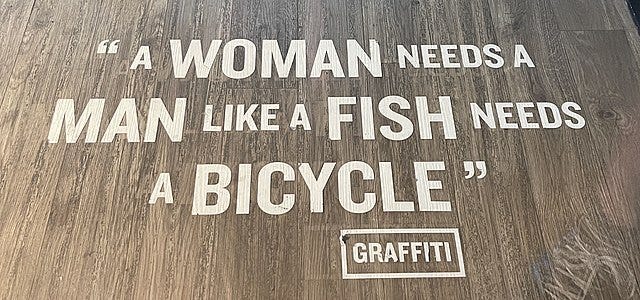What's Wrong with the World: The Lie about Men
Commentary
Visiting my grandmother when I was young, I remember a rather beat up car that often parked in front of her house. My father would be regularly amused by a faded bumper sticker on it that read, “a woman needs a man, like a fish needs a bicycle.” What amused him was not the sticker itself, but the unpleasant sentiment behind it. It was a sentiment expressed in a book by the New York Times feminist columnist Maureen Dowd, Are Men Necessary. Modern, sophisticated, and ever-so-clever, the answer, never clearly stated, but clearly implied was that men were not necessary at all. In more recent years, it has become again, smart and sophisticated to speak of masculinity as “toxic,” and harmful. Maleness itself became a problem, dangerous to women and to society. In various contexts, much of modern western society has come to see men as unnecessary enemies of women and masculinity itself as toxic.

Even in the Church today, masculinity sometimes (or often) seems to be seen as harmful or as not to belong. Most Churches are run largely by women; true, the priest is a man, but every other position is typically filled by women from altar servers, to parish employees, to the often massive numbers of EMHCs that many Churches typically use. Still more, the liturgy itself is too often hardly masculine or one that might appeal to men. The songs are watered down, bland lyrics with sing songy tunes that speak of us being gathered in where all (not the trads) are welcome to build the city of God. Again, what here could appeal to a man who took his masculinity (or the faith) seriously?
Against this rejection of their masculinity many young men today have finally rebelled. They have refused to accept masculinity being labeled as “toxic,” and have resisted the urge to feminize them. Unfortunately, they have done so by adopting a form of masculinity that is far from an authentic masculinity. This is the masculinity of an Andrew Tate. In an earlier post, I referred to this as an “ersatz,” or false masculinity, but, in a sense, it would be more accurate to refer to it as simply pagan masculinity. For it is indeed the masculinity of generations of pagans. A popular social media influencer, Tate is known for his brand of “masculinity,” brags about his lack of loyalty to women, his fame, and his similarities (in his mind) to Genghis Khan.
As I observed earlier, young men today frustrated by having maleness labeled as “toxic” and themselves as unnecessary, may find Tate’s apparently unapologetic masculinity attractive, even if it be a kind of pagan masculinity. It is pagan in its desire to dominate, to seek fame, status and power in a way that gratifies and serves only the self. It is a masculinity of indulgence, especially indulgence in the vices to which men are so prone: anger and lust.
And yet, as long as the young are being presented with what only seems two options: reject their masculinity as “toxic” or choose the “masculinity” of the pagan, it is hard to blame them very much for the latter choice. We have failed to present them with an authentic masculinity that is true to the nature of man; not the nature of fallen men--such is the masculinity of the pagan-- but the masculinity of men as God has created them to be.
Where the pagan masculinity of the Tates of the world boasts of conquests of women, a truer masculinity is that proposed by John Paul II, in his words, “It is the duty of every man to uphold the dignity of every woman.” Or consider St. Paul, “husbands, love your wives even as Christ loved the Church, handing himself over for her…” (Ephesians 5:25). Where the pagan masculinity unapologetically indulges in anger and lust, the truer, Christian masculinity is that of St. Paul, “For God gave us a spirit not of fear but of power and love and self-control” (2 Tim. 1:7). Where the pagan masculinity is essentially a surrender to self-indulgence, the Christian masculinity is one of self-sacrifice, “for even the Son of Man did not come to be served, but to serve, and to give His life a ransom for many “(Mark 10:45).
Too many young men have been presented with a false choice by the world. They have been told their masculinity is dangerous and oppressive and harmful. But in rejecting this view, they have too often fallen for a masculinity that is essentially a surrender to the fallen nature of man: the masculinity of the pagan world. Against this, we must insist, not on the pagan masculinity of indulgence and weakness, but on the Christian masculinity, a spirit of power, love, self-control, service, and self-sacrifice. And it is certain that the world needs this sort of masculinity.

